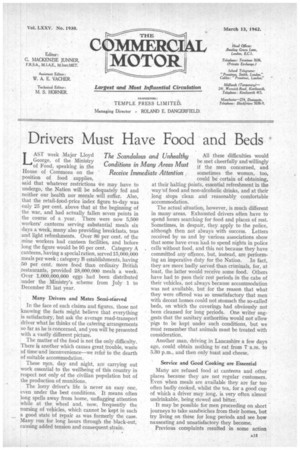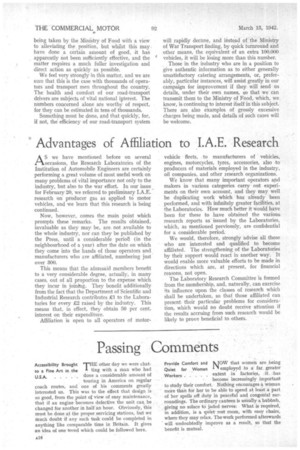Drivers Must Have Food and Beds
Page 17

Page 18

If you've noticed an error in this article please click here to report it so we can fix it.
LAST week Major Lloyd George, of the Ministry of Food, speaking in the House of Commons on the position of food supplies, said that whatever restrictions iize may have to undergo, the Nation will be adequately fed and neither our health nor morale will suffer. Also, that the retail-food-price index figure to-day was only 25 per cent, above that at the beginning of the war, and had actually fallen seven points in the course of a year. There were now 5,500 workers' canteens serving substantial meals six days a week, many also providing breakfasts, teas and light refreshments. Over 80 per cent, of the mine workers had canteen facilities, and before long the figure would be 95 per cent. Category A canteens, having a special ration, served 15,000,000 meals per week ; category B establishments, having 50 per cent. more food than ordinary British restaurants, provided 28,000,000 meals a week. Over 1,000,000,000 eggs had been distributed under the Ministry's scheme from July 1 to December 31 last year.
Many Drivers and Mates Semi-sfarved In the face of such claims and figures, those not knowing the facts might believe that everything is satisfactory, but ask the average road-transport driver what he thinks of the catering arrangements so far as he is concerned, and you will be presented with a vastly different picture.
The matter of the food is not the only difficulty. There is another which causes great trouble, waste of time and inconvenience—we refer to the dearth of suitable accommodation.
These npn, day and night, are carrying out work essential to the wellbeing of this country in respect not only of the civilian population but of the production of munitions.
The lorry driver's life is never an easy one, even under the best conditions. It means often long spells away from home, unflagging attention while at the wheel and, now, frequently the nursing of vehicles, which cannot be kept in such a good state Of repair as was formerly the case. Many run for long hours through the black-out, causing added tension and consequent strain. All these difficulties would be met cheerfully and willingly if the men concerned, and sometimes the women, too, could be certain of obtaining, at their halting points, essential refreshment in the way 'offood and non-alcoholic drinks, and at their long stops clean and reasonably comfortable accommodation.
The actual situation, however, is much different in many areas. Exhausted drivers often have to spend hours searching for food and places of rest. Sometimes, in despair, they apply to the police, although then not always with success. Letters received by us and by various associations show that some have even hadto spend nights in police cells without food, and this not because they have committed any offence, but, instead, are perform ing an imperative duty for the Nation. In fact, they are more badly served than criminals, for, at least, the latter would receive some food. Others have had to pass their rest periods in the cabs of their vehicles, not always because accommodation was not available, but for the reason that what they were offered was so unsatisfactory that men with decent homes could not stomach the so-called beds, on which the coverings had obviously not been cleansed for long periods. One writer sug • gests that the sanitary authorities would not allow pigs to be kept under such conditions, but we must remember that animals must be treated with consideration.
Another man, driving in Lancashire a few days ago, could obtain nothing to eat from 7 a.m. to 5.30 p.m., and then only toast and cheese.
Service and Good Cooking are Essential Many are refused food at canteens and other places because they are not regular customers. Even when meals are available they are far too often badly cooked, whilst the tea, for a good cup of which a driver may long, is very often almost undrinkable, being stewed and bitter.
It may be possible for men proceeding on short journeys to take sandwiches from their homes, but try living on these for long periods and see how nauseating and unsatisfactory they become.
Previous complaints resulted in some action being taken by the Ministry of Food with a view to alleviating the position, but whilst this may have done a certain amount of good, it has apparently not been sufficiently effective, and the matter requires a much fuller investigation and direct action as quickly as possible.
We feel very strongly in this matter, and we are sure that this is the case with thousands of operators and transport men throughout the country. The• health and comfort of our road-transport drivers are subjects of vital national ipterest. The numbers concerned alone are worthy of respect, for they can be estimated in tens of thousands.
Something must be done, and that quickly, for, if not, the efficiency of our road-transport system will rapidly decline, and instead of the Ministry of War Transport finding, by quick turnround and other means, the equivalent of an extra 100,000 vehicles, it will be losing more than this number.
Those in the industry who are in a position to give authentic information as to either generally unsatisfactory catering arrangements, or, preferably, particular instances, will assist greatly in our campaign for improvement if they will send us details, under their own names, so that we can transmit them to the Ministry of Food, which, we know, is continuing to interest itself in this subject. There are also examples of grossly excessive charges being made, and details of such cases will be welcome.




















































